Hi my first post so hope I’m in the right place.
I’ve been diagnosed with an underactive thyroid for the last 9 years, my gp noticed I had a goitre even though I had gone for something else. A few blood tests later and an ultrasound which showed a few nodules but nothing serious I was started on Levo.
I was on 100mcg but since April it has been dropped to 75mcg due to my TSH going below range, unfortunately I felt worse than usual so I’m now alternating 75mcg/100mcg every other day.
In the past year I’ve been put on antidepressants for low mood and HRT for night sweats/flushes. I’ve since come off these as I didn’t feel any different taking them.
I’m now starting to think that it maybe thyroid related. I went to my Gp yesterday as I’m due blood tests at the end of July and asked if she could do some extra tests that I had seen recommended. These were Vit D, Vit b12, magnesium, T3 & iron. The gp refused to add these on but agreed to Vit B12 on,y. She said she would repeat TSH, T4 and folate. I have now managed to gain access of my past blood tests.
Any advice would be gladly received on where I can go from here. I was told on a USA site I may not be converting T4 to T3, but I’m not very clued up.
Thank you

